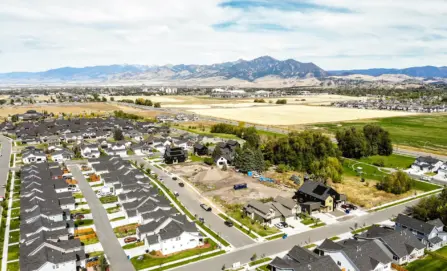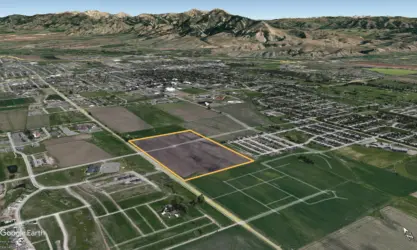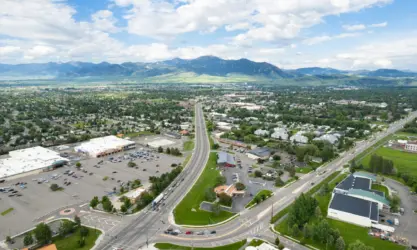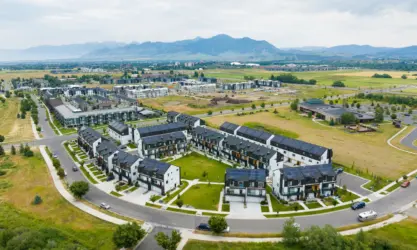View All
Bozeman Real Estate Market
Development
Bozeman Business
Bozeman Neighborhoods
Get Outside
Moving to Bozeman
Retiring in Bozeman
Just for Fun
The Selling Side
The Buying Side
Bozeman Nonprofits
Affordable Housing
Community Events
Living in Bozeman
Belgrade Real Estate
Livingston Real Estate
Manhattan Real Estate
Three Forks Montana Real Estate
Big Sky Real Estate
Moving to Montana
Home Ownership
Living in Montana
Bozeman Real Estate Group

Why Are Homes in Bozeman So Expensive?
On Feb 04, 2026
Over the past several years, demand for housing in Bozeman has often outpaced supply, pushing prices higher and making the market more competitive than many locals were used to. While things have cooled off from the breakneck pace of 2020 to 2022, many of the forces that drove prices up in the first place are still very much in play.
This article takes a closer look at what’s shaping Bozeman’s housing market today, from the cost of building new homes to migration patterns, remote work, and the local economy.
Scarcity
Bozeman’s real estate market is no longer defined by the extreme scarcity seen during the peak years of 2020–2022, but supply constraints are still very much part of the story.
In 2021, inventory reached historic lows, with the number of available homes dropping sharply while buyer activity surged. By mid-2022, and continuing through 2023 and 2024, inventory began to recover as higher interest rates slowed demand and more homes came on the market. Buyers today have more options, more time to make decisions, and greater negotiating power than they did just a few years ago.
That said, supply has not fully caught up to long-term demand. Bozeman continues to attract new residents, and the pace of homebuilding has not been sufficient to meaningfully increase housing availability at all price points. As a result, home prices have largely stabilized rather than corrected dramatically.
👉🏻 If you’d like to explore the data behind these trends, we share ongoing updates on local pricing, inventory, and sales activity on our market statistics page. You can also browse homes with recent price reductions for a snapshot of where buyer leverage is showing up today.
The Cost of Development
The short answer is that new construction in Bozeman remains complex, slow, and expensive, even as market conditions have normalized. While demand has cooled, the underlying challenges to building in Bozeman have not eased in a meaningful way.
Land within Bozeman city limits is limited and costly, and those land costs are ultimately reflected in the price of new homes. Development is also shaped by zoning regulations, infrastructure requirements, impact fees, and a lengthy approval process, all of which add time and expense before a home is ever built. Construction costs, while no longer rising at the pace seen during the height of the pandemic, remain elevated compared to pre-2020 levels.
For builders and developers, these realities mean that it is increasingly difficult to deliver new homes at lower price points, particularly within city limits. As a result, much of the new housing coming to market tends to be priced higher, which limits its ability to relieve pressure on affordability overall.
👉🏻 To get an idea of what "affordable" means in our area, check out this list of the cheapest homes for sale near Bozeman.
Out-of-State Money
During the pandemic years, many buyers relocated to Bozeman from higher-cost markets. With greater purchasing power, they were able to enter Bozeman's competitive real estate market aggressively, often with cash or limited financing contingencies.
During that period, cash transactions became far more common. When buyers are able to purchase without financing, they are not subject to appraisal requirements, which can allow homes to sell above appraised value. In a fast-moving market, those higher sale prices quickly became comparable sales, contributing to rapid price appreciation across many neighborhoods.
That said, migration into our area has slowed, but not stopped entirely. Buyers relocating from other areas continue to enter the market, and in many cases still bring greater financial flexibility than local buyers. While this dynamic is no longer driving runaway price growth, it remains one of several factors supporting home values, even as overall demand has cooled.
Working Remotely
The expansion of remote work during the pandemic played a major role in Bozeman’s surge in housing demand. Almost overnight, where someone worked mattered far less than how they wanted to live. Outdoor access, breathing room, and lifestyle jumped to the top of the priority list—and places like Bozeman suddenly made a lot of sense.
That shift brought an influx of new residents earning wages tied to much higher-cost metropolitan areas such as San Francisco, Seattle, and Atlanta. In a market already short on housing, that added purchasing power pushed competition—and prices—higher at a rapid pace.
Today, remote work isn’t driving the market the way it did from 2020 to 2022. But it hasn’t disappeared either. Bozeman continues to appeal to remote and hybrid workers, helped by the connectivity of Bozeman Yellowstone International Airport and the ability to pair professional careers with year-round access to the outdoors.
Tech Jobs
Bozeman's identity as a tech hub began in the late 1990s with the founding of RightNow Technologies, later acquired by Oracle. Since then, a mix of established companies and startups have followed, drawn by talent coming out of Montana State University, a strong quality of life, and the ability to attract and retain skilled workers who want something different than life in metro areas
These jobs tend to pay well, and those higher incomes translate to greater purchasing power. While tech employment isn’t expanding at the breakneck pace it once was, it continues to support demand at higher price points and contributes to why home prices here remain elevated compared to other Montana communities.
Bozeman didn’t become expensive overnight because of tech, but tech has become one of the steady, behind-the-scenes forces shaping who can afford to buy here.
Quality of Life
At the end of the day, much of what drives Bozeman’s housing market comes down to quality of life. And that part of the story hasn’t changed.
Bozeman offers something that’s increasingly hard to find: a strong sense of community, easy access to the outdoors, good schools, low crime, and the ability to step away from daily life and be on a trail, river, or the ski hill in minutes.
You can’t put a price tag on mountain air or an evening walk up Peets Hill, but the demand to live in a place like this is real. For some, Bozeman’s growth has made it feel less like the town they once knew. For others, that same growth has made it more livable, more connected, and more dynamic.
What’s clear is that Bozeman continues to attract people who are drawn to the lifestyle it offers. And while affordability remains a real and ongoing challenge, the qualities that make Bozeman desirable aren’t going away. As long as people value access to the outdoors, community, and a slower pace paired with meaningful work, Bozeman will continue to be a place people want to call home.
Ready for more?
👉🏻 See what's on the market
👉🏻 Follow us on Instagram
👉🏻 Sign up for our newsletter


